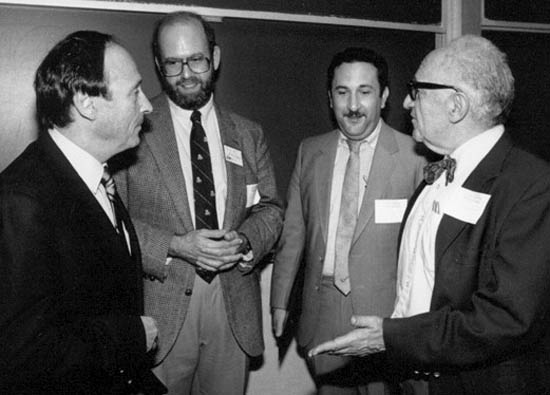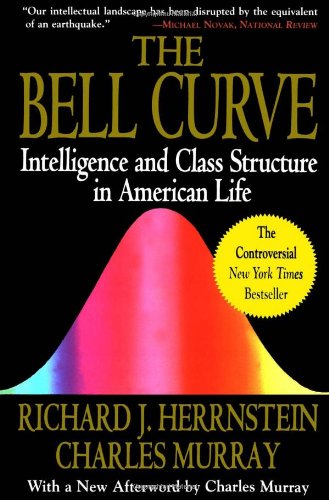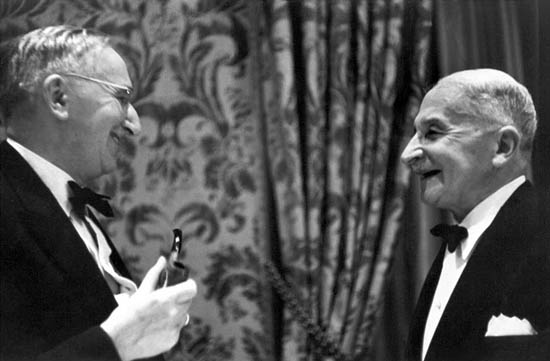Libertarians and Race Realism
Gilbert Cavanaugh, American Renaissance, October 11, 2013
For those of us who enjoy a touch of libertarianism, the news of Jared Taylor’s recent appearance at Hans-Hermann Hoppe’s Property and Freedom Society was well received. It also begs the valuable question, “Which libertarians are friendly to race realism, and which are not?” As it stands, what Mr. Taylor wrote over a decade ago in his review of Prof. Hoppe’s Democracy: The God That Failed is still (unfortunately) for the most part true: “Libertarians, to the extent they have any influence on American policy, have been bitter opponents of immigration control. From the Cato Institute, to the Libertarian Party, to the editorial pages of the Wall Street Journal, their generally laudable opposition to government control leads them to view border control as just one more intolerable act of government tyranny.” However, both then and now, Prof. Hoppe and a small band of allies within the libertarian movement have fought that trend; and they deserve notice for their principled and courageous stance.
Prof. Hoppe (sometimes referred to as “HHH”) and his Property and Freedom Society is a good place to start. Founded in 2005, it was forged in large part out of Prof. Hoppe’s dislike for the mainstream and politically correct libertarian group, the Mont Pelerin Society, of which he had been a member. Both the PFS’s tone and speakers lists have been influenced from the beginning with touches of race-realism and anti-establishmentarianism gleaned from Prof. Hoppe’s participation in the John Randolph Club. The latter group, paleo-libertarian in pedigree, featured many speakers familiar to AmRen readers, such as Taki Theodoracopulos, Joe Sobran, Sam Francis, and during the early years, even Michael Levin and Jared Taylor. Unfortunately the Randolph Club has been more or less dormant for many years now, after several of its main participants died, and the remnants began fighting among themselves. Occasional AmRen contributor James P. Lubinskas’ essay, “The End of Paleoconservatism” examines that group’s fall in greater detail.
The talks given at Prof. Hoppe’s gatherings can be found easily on YouTube (although this year’s are not available yet), and feature not only Richard Spencer and Peter Brimelow, as Mr. Taylor mentioned, but other prominent race realists as well, such as John Derbyshire and Paul Gottfried. Prof. Hoppe also wrote an interesting reflection on the origins and nature of his society, which can be found on VDARE — frankly, any libertarian willing to post on VDARE is a libertarian worth listening to. Additionally, much of Prof. Hoppe’s writings on immigration and discrimination can be found online. Especially noteworthy for AmRen readers are, “On Free Immigration and Forced Integration” and “Secession, the State, and the Immigration Problem.”
Lew Rockwell is another libertarian figure worth knowing about, but is something of an enigma. In 1982 he founded the Ludwig von Mises Institute, which quickly became a conservative and radical counterweight to the increasingly liberal and mainstream Cato Institute. Murray Rothbard, considered a kind of libertarian god to many, would soon join him after being purged from the Cato Institute, which he had helped found. The Mises Institute, while more libertarian than anything else, has time and again shown itself to be unconcerned with the taboos that even many other libertarians fear. It has published sharp critiques of such liberal totems as feminism and multiculturalism.
Mr. Rockwell would also go on to propose a “paleo libertarian alliance” in 1990 that would make the case for libertarians to avoid the company of certain “liberated” groups that had begun making common cause with the movement, such as habitual drug users, nudists, and the like. Instead, Mr. Rockwell argued that libertarians should establish closer ties with the rising paleo-conservative movement. That same year Mr. Rockwell took his own advice and started the paleo-libertarian Rothbard-Rockwell Report, which ran into the late ’90s and featured a plethora of AmRen contributors such as Michael Levin, Paul Gottfried, and Robert Weissberg, as well as the then less well known Hans-Hermann Hoppe.
During this period, a very harmonious relationship existed between race realists, paleos, and libertarians. Murray Rothbard endorsed Pat Buchanan for president in 1992, the Mises Institute was unafraid of inviting both Sam Francis and Joe Sobran to its conferences, and rumor has it that Mr. Rockwell was even ghost writing newsletters for one Ron Paul, which referenced Jared Taylor in a positive light. The newsletters were controversial due to their unconventional views on Martin Luther King and racial orthodoxy. It was out of this paleo-libertarian atmosphere that LewRockwell.com was created in 1999.
Though originally not much different in pedigree and authorship from the Rothbard-Rockwell Report, the site has become steadily more politically correct. Who is featured on the website has to be separated into three categories: those who are listed on the contributors page, those who are not listed but still have personal pages, and those who have been deleted. There are many good writers listed: Prof. Hoppe, Pat Buchanan, and Clyde Wilson to name a few. There are also many good writers who are not listed, but still have pages, such as: Keith Preston, Marcus Epstein, Chilton Williamson, Michael Tuggle and H. A. Scott Trask. As for those who have been deleted, many were the best, such as Michael Levin and Jared Taylor.
VDARE published the most informative account of LewRockwell.com’s devolution, but Lew Rockwell’s own suspect recanting of what was, What I Learned From Paleoism, is also interesting. Unfortunately it seems likely that, with time, LewRockwell.com will continue its slide into political correctness and either delete or hide more authors — but for the time being, it is still worth visiting; it still carries the likes of Fred Reed and Chuck Baldwin.
Another important highlight of LewRockwell.com are the archives of the late Murray Rothbard — a man frequently credited with both inventing Anarcho-Capitalist theory, and popularizing Austrian economics in America. Not only was he a proud Copperhead and a vocal supporter of Strom Thurmond in his college days, but he also wrote a glowing review of Richard Hernnstein and Charles Murray’s The Bell Curve, and his famous essay, Egalitarianism as a Revolt Against Nature, is a masterpiece.
In many ways, it could be said that Hans-Hermann Hoppe is keeping alive the kind of fearless and conservative-oriented libertarianism that Murray Rothbard so perfectly embodied, and that Lew Rockwell’s various organizations and publications kept afloat for so long until his slow retreat of the last decade and a half.
The politically correct libertarians (who have many different monikers: beltway libertarians, left/liberal libertarians, and neo-libertarians are the most common) oscillate between vociferously denouncing their more realistic counterparts, and completely ignoring them. Reason magazine, put out by the Reason Foundation, is typical in this respect. While it acts as if Hans-Hermann Hoppe doesn’t exist, (just as The National Review acts as though Paul Gottfried and Jared Taylor do not exist) it has also gone out of its way to attack Ron Paul for being too right-wing. Every organization funded by the Koch Brothers either attacks from the left or completely ignores conservative libertarians. This is true of Reason, the Heritage Foundation, George Mason University, etc. Cato-affiliated Tom Palmer seems only to attack, and does so over and over. Meanwhile, the so-called “Bleeding Heart Libertarians” are almost the exact opposite in this regard, and seem to dedicate all of their time to earning a pat on the head from the Cultural Marxist left by ignoring any and every libertarian who has ever been touched by controversy. Unsurprisingly, they advocate open borders.
The two most powerful open-borders radicals among the libertarian ranks are, by far, Anthony Gregory and Walter Block. Walter Block has been with the Mises Institute for some time now, and is frequently Prof. Hoppe’s sparring partner on immigration. One such ideological duel can be found in this issue of the Journal for Libertarian Studies (which is put out by Mises), in which John Hospers, the founder of the Libertarian Party, voiced emphatic opposition to the idea of open borders. Anthony Gregory is of a younger generation of libertarians, and works for the fairly small Independent Institute — which also employs Alvaro Vargas Llosa (son of Mario) who recently penned a gushingly pro-immigration book. Troublingly, Anthony Gregory and Walter Block have both found ways to be featured frequently in what are otherwise reliable bastions of sensible libertarianism, namely the Mises Institute and LewRockwell.com. Mr. Gregory seems to have redoubled his efforts, having made it into The American Conservative as well, while also being published in liberal publications such as The Huffington Post.
Two other important libertarian open-border advocates are Alex Nowrasteh and Jesus Huerta de Soto, while two other important libertarian immigration restrictionists are Gary North and Sean Gabb. It must be conceded, however, that the former duo has a great deal more influence than the latter. Mr. Nowrasteh has gained prominence from the media’s focus on immigration over these last few months, while Mr. De Soto is something of a mainstay in the libertarian scene. Meanwhile, Gary North has developed a reputation as a bit of an old coot, and is often cited as someone the Mises Institute should purge, while Sean Gabb has still not gained much name recognition in the United States.
If there were to be an underdog victory for immigration restrictionist libertarians, it would likely come not only from the groundwork laid by Prof. Hoppe and his annual gatherings of banished intellectuals, but from the historian Thomas Woods, Jr.. Most famous for his surprise hit, “The Politically Incorrect Guide to American History,” Mr. Woods also writes for Mises, LewRockwell.com, and a handful of other publications. From time to time, he shows fairly strong conservative leanings; in his review of Prof. Hoppe’s book, he recommended reading it in tandem with Pat Buchanan’s then-new The Death of the West. Additionally, he was once a member of the League of the South — and he is level-headed when it comes to immigration.
Self-styled libertarians and paleo-libertarians can also be found throughout the alternative/dissident right. The late Joe Sobran, who maintained a strong friendship with Murray Rothbard until the latter’s untimely death, was ultimately convinced by Hans-Hermann Hoppe’s Anarcho-Capitalist ideas and went from being a strict constitutionalist to a “reluctant anarchist.” Ilana Mercer has similar leanings as well, and writes a paleo-libertarian column for the Russian organization, RT. Richard Spencer of NPI considers Prof. Hoppe, Dr. Rothbard, and Ludwig von Mises to be essential reading. Taki’s Magazine which in the past has featured both Ms. Mercer and Mr. Spencer, has always had paleo-libertarian leanings as well.
However, when all is said and done, immigration restrictionists within libertarian circles have just as hard a time as those anywhere else. The Mises Institute has been labeled a hate group — an indignity that the Cato Institute never had to suffer, and it is well known that the latter has a great deal more money than the former. Part of the reason Prof. Hoppe now lives in Turkey may be because so many other libertarians were trying to throw him under the bus (though his troubles with Cultural Marxist academia probably influenced the decision as well). But, in defiantly inviting Jared Taylor to the latest gathering of the Property and Freedom Society, Prof. Hoppe has struck another blow to the stifling political correctness and dispossessing open border radicalism of mainstream libertarianism; with any luck, others will follow his lead.



















